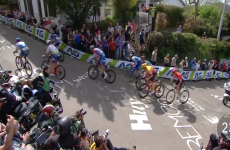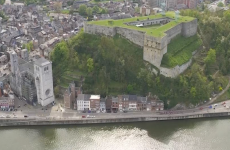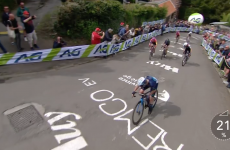Description
April 20, 2022
La Flèche Wallonne 2022 – Blegny – Mur de Huy : 202,1 km
La Flèche Wallonne is the second of the three Ardennes Classics and without a doubt the most predictable –
Show more...
April 20, 2022
La Flèche Wallonne 2022 – Blegny – Mur de Huy : 202,1 km
La Flèche Wallonne is the second of the three Ardennes Classics and without a doubt the most predictable – almost every edition since the turn of the millennium has ended in a thrilling drag race up the iconic finishing climb, the Mur de Huy. The race is one of cycling’s oldest, with its first edition taking place back in 1936, and one of the few to continue on through the second world war. The earlier editions of the race were vastly different to the classic drag-race format we’ve come to know and love. These older races often exceeded distances of 250km, with the longest ever travelling for a leg-shattering distance of 300km from Tournai to Liège back in 1938. The organisers have tried to spice up the race a little over the last couple of editions by moving the penultimate climb, the Côte de Cherave, closer to the finish. While it has catalysed some late attacks, the Cherave has ultimately failed to change the outcome of the race – we still see an inevitable drag race up the Mur year after year.
Dylan Teuns (Bahrain Victorious) scored the biggest one-day win of his career, taking out La Flèche Wallonne ahead of five-time winner Alejandro Valverde (Movistar) and Aleksandr Vlasov (Bora-Hansgrohe).
“I always dream of a Classic victory and today it happened finally,” an elated Teuns said in the post-race flash interview. “I was never so strong in the Spring Classics like this year and I’m super happy with this victory.”
La Flèche Wallonne is almost always decided in the last 300 metres and the formula continued this year, with Movistar’s Enric Mas attempting to launch Valverde into the steepest section of the climb.
Vlasov tried to accelerate on the inside but found himself bogged down in his gears and Teuns came past to ramp up the pace, tracked closely by Valverde. The Spanish veteran gave one big push in an attempt to get in front of Teuns but had to concede to his younger rival in the final 50 metres, while the Bora-Hansgrohe rider suffered to the line for the final podium spot.
QuickStep-AlphaVinyl’s dry run continued as World Champion Julian Alaphilippe could only manage fourth.
“It’s maybe not always the best one who wins, but on the Mur, it’s definitely a climb where you need the legs and today I had strong legs. Maybe I was the strongest today,” Teuns said. In 2017, Teuns was third on the Mur de Huy and learned Valverde’s winning formula but it took five years to have the blend of form, confidence and fortune to put it to work.
“I knew a little bit the place where he always makes the first acceleration,” Teuns said. “Five years ago when I became third I was there in the wheel, and when he made the second move I couldn’t follow anymore. Today, I made the second move and I felt him coming but I still had a little left in the legs to keep him behind me.”
The 2022 edition of La Flèche Wallonne was one of the faster editions of the race, clocking in at 42.97 kph.
Valverde, turning 42 in five days, said he wished he was a little stronger but couldn’t have done anything more after such a hard race. “I didn’t have the sensations like in years past when I thought I could suffer a little more, but today, no way, I was at my absolute limit. The whole race was very fast. I think we did the fastest Mur de Huy ever.”
Vlasov was happy with his first podium in a Belgian classic and in his Flèche debut. “I’m very proud of this result and of my team, they did a good job. It’s impressive, first podium at first Flèche Wallonne. I did the maximum that I could.
“Dylan Teuns surprised me today because he was the strongest at the finish and he won it with a huge advantage. I saw Alaphilippe behind me, so the race was how we expected with all the favourites together for the last climb.”
How it unfolded
La Flèche Wallonne got underway in Blegny without Michael Matthews (BikeExchange-Jayco), a late withdrawal due to illness. After a brisk opening to the race, the day’s early break took shape a little over 30km in, when Daryl Impey (Israel-Premier Tech), Simon Guglielmi (Arkéa-Samsic), Bruno Armirail (Groupama-FDJ), Chris Juul Jensen (BikeExchange-Jayco), Jimmy Janssens (Alpecin-Fenix), Morten Hulgaard (Uno-X Pro Cycling Team), Valentin Ferron (TotalEnergies) and Pierre Rolland (B&B Hotels-KTM) forged clear.
By the second of the day’s 11 climbs, the Côte des Forges, the group had expanded to ten riders, with Jens Reynders (Sport Vlaanderen-Baloise) and Luc Wirtgen (Bingoal-Pauwels Sauces) bridging across. Their advantage edged out beyond three minutes shortly afterwards, but a loose coalition of Ineos, UAE Team Emirates and QuickStep-AlphaVinyl ensured it went no further.
The final 90 kilometres of the race were composed of three laps of a circuit over the Côte d’Ereffe, Côte de la Cherave and the Mur de Huy, and pre-race contender Tom Pidcock (Ineos) was soon visible near the rear of the bunch. He was distanced on the first time up the Mur de Huy and he abandoned shortly afterwards.
With a slight crosswind buffering the race on the exposed roads after the Mur de Huy, Bahrain Victorious made an effort to force an echelon, and though their attempt failed, it was a demonstration of intent ahead of the finale.
The pace continued to augment on the second lap of the circuit, where Tadej Pogacar had to chase back on after a puncture, while out in front, the break was reduced to five riders: Impey, Guglielmi, Armirail, Janssens and Ferron.
QuickStep and Ineos performed much of the pace-setting on that second lap, but it was EF Education-EasyPost who took up the reins on the Cherave, where Alberto Bettiol teed up a stinging attack from Simon Carr.
The Briton was perhaps expecting company, but he pressed on gamely, picking up Guglielmi on the second ascent of the Mur de Huy, and then leading the Frenchman back up to the break over the other side.
As usual, there was a scramble for positions before the Mur, but the pace in the bunch relented on the climb itself, allowing the six leaders to maintain a 40-second lead at the beginning of the final lap, though it would be whittled down steadily thereafter, despite Carr’s dogged attempt to stay clear.
The presence of Evenepoel and Pogačar in this race had sparked speculation that the winning move might go clear before the Mur de Huy for the first time in almost two decades, but instead, an anticipatory attack came from Cofidis, who propelled Remy Rochas off the front on the Cherave. He was followed by Mauri Vansevenant (Quickstep-AlphaVinyl), and soon Søren Kragh Andersen (Team DSM) blasted across to the pair on the descent in an attempt to become the first escapee to survive on the Mur de Huy since Igor Astarloa in 2003.
Rochas let go of the wheels with 5km to go and Kragh Andersen towed Vansevenant with a 10-second lead as they approached the base of the Mur de Huy but the Movistar-led bunch put them out of their misery with 850m to go.
As per tradition, the race came down to a slugging match on the Mur de Huy, and three-time winner Julian Alaphilippe, fourth on the day, had no argument with the verdict. “In the final, the legs spoke,” he said. “The strongest rider won today.”
Results :

![La Flèche Wallonne 2022 [LAST 10 KM]](/wp-content/uploads/2022/04/La-Fleche-Wallonne-2022-LAST-10-KM.png)











